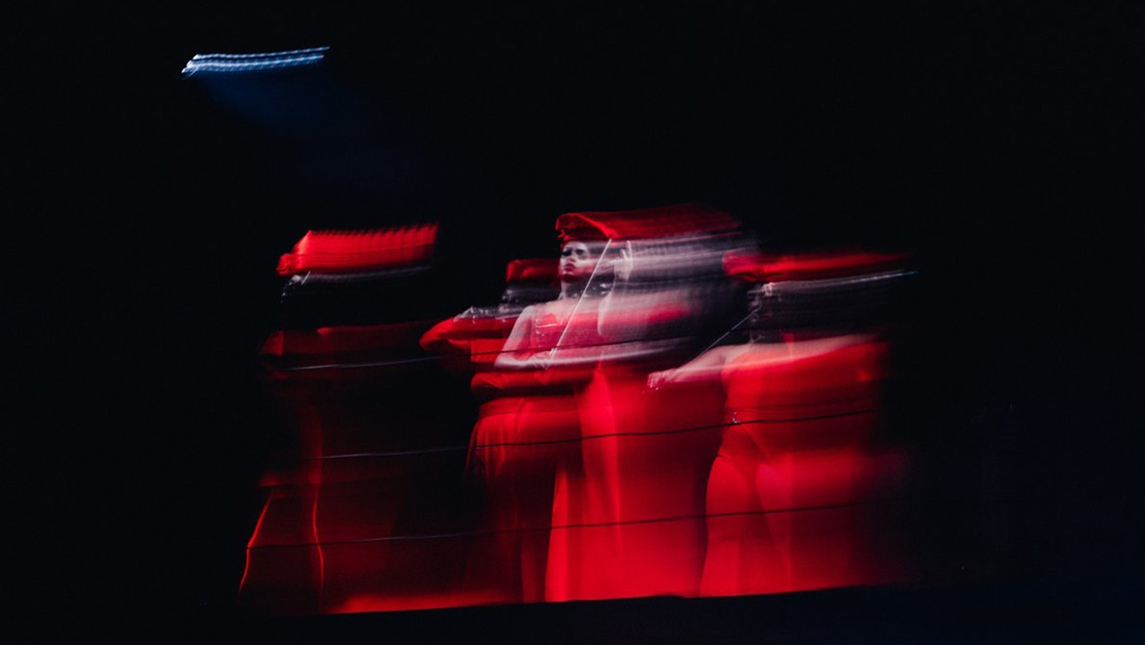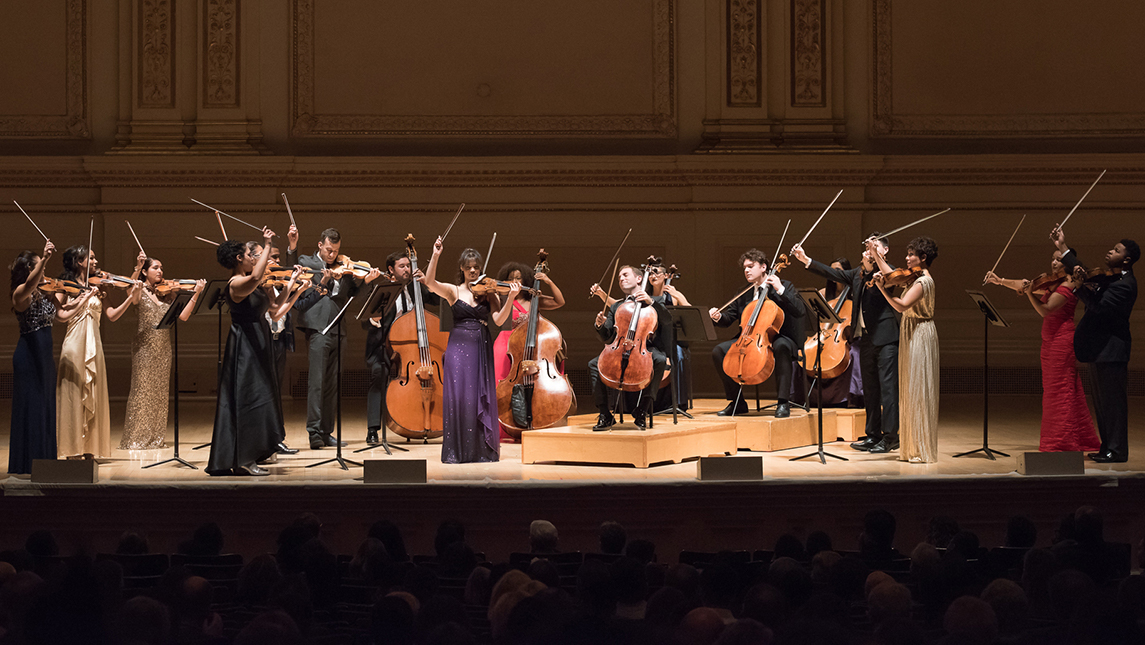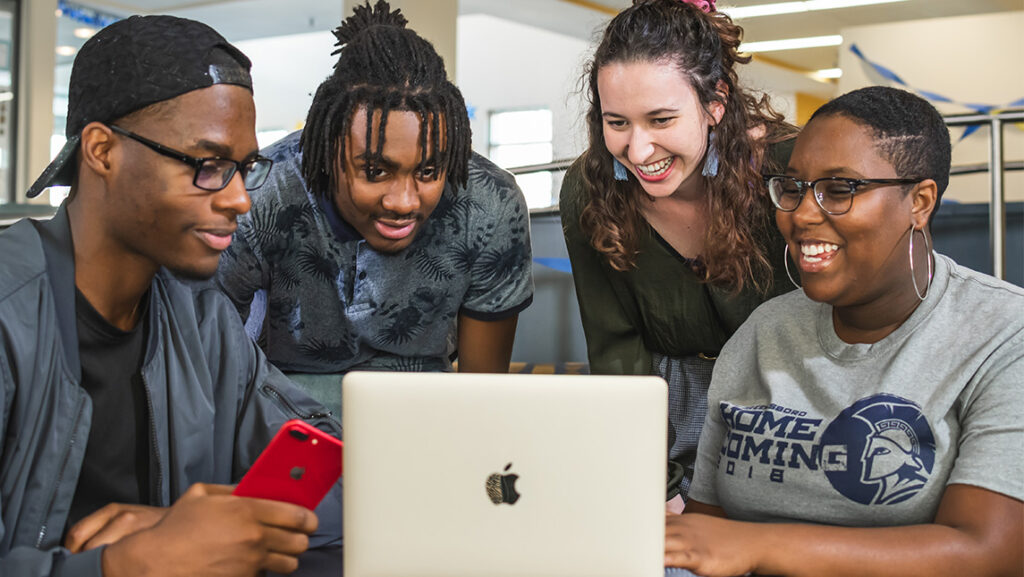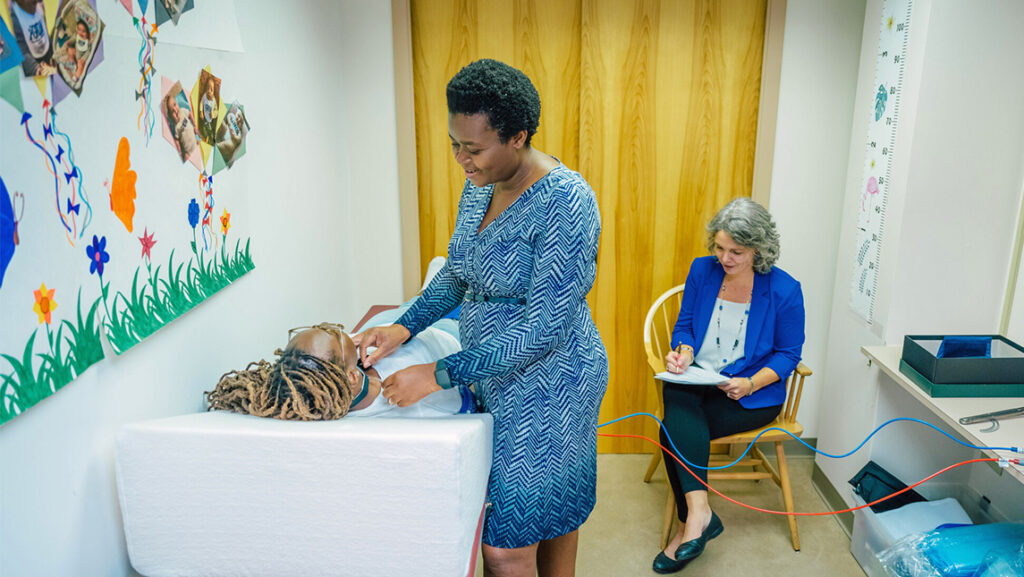
The Sphinx Virtuosi, one of the nation’s most dynamic professional chamber orchestras, will perform on campus as part of the 2021-22 University Concert and Lecture Series on Friday, Oct. 8. Tickets can be purchased here. In addition to the concert, members of the orchestra will host a masterclass for string students in the College of Visual and Performing Arts and visit with local elementary school students as part of the Lillian Rauch Beginning String Program.
Comprised of the nation’s top Black and Latinx classical soloists, the Virtuosi and its members are dedicated to increasing racial and ethnic diversity in classical music and work together as cultural ambassadors to reach new audiences. Acting as a bridge between minority communities and the classical music establishment, the Sphinx Virtuosi continue to garner critical acclaim during their annual national tours to many leading venues around the country. The organization works to advance diversity in classical music while engaging young and new audiences through performances of kaleidoscopically varied repertoire, including traditional masterpieces and more seldom-presented works by composers of color.

Ahead of the performance, University Communications interviewed Lady Jess, a violinist in the ensemble. Apart from Sphinx, she is co-artistic director and concertmistress of the Urban Playground Chamber Orchestra in New York City, and her artist credits include collaborations with Stevie Wonder, The Roots, Jennifer Lopez, Max Richter, Alicia Keys, Diana Ross, and Spike Lee. More of her recent projects include being a soloing member of Beyoncé’s band and performing on the Emmy-nominated documentary “Homecoming” with the accompanying live album; accompanying the On The Run II Tour with Beyoncé and Jay-Z; and recording and arranging strings for the Carters’ Grammy-nominated joint album “Everything is Love” and the recently released soundtrack to Disney’s “The Lion King” with Hans Zimmer, as well as “Da Five Bloods” with Terence Blanchard and more.
Tell me a little about your background in music and your journey into the orchestra.
I am from Charlotte, North Carolina, and I went to the University of North Carolina School of the Arts, so my Southern roots are pretty strong. I started playing violin when I was eight years old. I saw a Black kid playing violin on Mr. Rogers, and once I saw that representation, I decided that I wanted to do that, so that’s how I started. I am coming to Sphinx a bit late in my career. Typically, musicians are exposed to Sphinx when they are in school, but I wasn’t exposed to it until later.
What sets Sphinx Virtuosi apart from other chamber orchestras?
There’s this feeling of shared circumstance – a chemistry that comes out of being in the organization. Whether or not I share the same socioeconomic circumstances with the person next to me or not, there’s the shared experience of being a Black or Latinx person in classical music. There are things so representative of Latinx and Black musicians, so in our culture, we share our musical styles and celebrations that come out of experiencing things in a different way by virtue of the fact that we are not white in a historically white tradition. I think that gives us an extra boost of energy. I certainly can’t speak for everyone, but I know that I have many Black colleagues that are tired of having to constantly prove that you deserve the equity given to the white person next to you. It’s this war against mediocrity you’ve been waging your whole life, and so to be able to sit down and play in an ensemble that has no conductor and is completely dependent on player chemistry, that shared experience becomes a direct trait of the sound and directly affects the sound. That shared experience gives our sound a specific timbre, a specific energy, a specific color that can’t be replicated.
Talk to me about the set list for your upcoming performance at UNCG. What musical journey are you taking the audience through?
The theme is “Tracing Visions,” which I think is a relevant one. The program explores modern contemporary classical music, which is very fresh and accessible to anyone in the audience. Then, you have traditional Latin pieces, and pieces that use voices of Black people. The whole program is kind of like an interchange of historical styles that represent varying cultures, and the “Tracing Visions” part explores how we got here – how are we presenting ourselves, and how are we moving forward? I think the power of the program forces people to engage with the music because it’s so vibrant. But in order to engage with the music, it forces you to confront that theme of “Tracing Visions.” I think that it especially personalizes the experience for each audience member who has read up on the program and familiarizes themselves with it beforehand.
What does it mean to you to be a part of Sphinx Virtuosi – to be a cultural ambassador and represent diversity in classical music?
It means everything. I’m a classically trained violinist who plays primarily classical music in New York, but I also did not have the traditional route to the stage that other people have had. So for me, representation is about my skin color. It is about my experience and how I’ve navigated my career as an interracial woman. But because of my specific path and story, I often find myself in a position of being the only one who understands this very visceral experience. This corner of the industry – classical music – is so niche and so different because of how I came to it. So if someone in the audience can resonate with me and my story, that means everything to me.
What do you want young, aspiring musicians to know, particularly those from racial and ethnic minority groups that are underrepresented in the classical music space?
For me personally, I want to reach the student in the audience who has experienced some of the things I have. I put myself through school. And being a POC in classical music can be very isolating. You can deal with a lot of imposter syndrome. I want to reach someone in the audience who looks like me, but who is also maybe working a 9-to-5 to make ends meet, or trying to get through school, or coming out of this pandemic and may or may not be financially stable, but desperately wants to finish their degree program or go to a specific school or conservatory. For me, letting them know that it’s going to be OK and that you can do it is extremely important.

Interview by Alexandra McQueen, University Communications
Photography courtesy of Lady Jess


